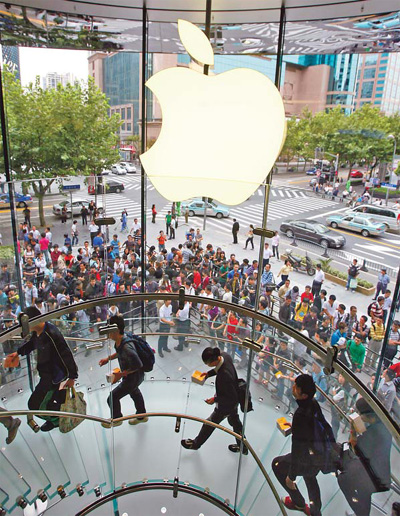Harsh reality behind Apple scandal
Problematic suppliers
In its supplier responsibility report, Apple admitted it has encountered many problems - including underage workers, involuntary or debt-bonded labor, and unsafe handling of dangerous chemicals - during its audits of 127 production facilities in China. Despite requests from environmental groups in China, Apple declined to list its suppliers.
|
Customers line up to buy the iPhone 4 at the Shanghai Apple Store (file photo, 2010). Taiwan-based Wintek Corp, which produces iPhone components for Apple, owns United Win Technology, whose plant in Suzhou was the site of n-hexane poisoning of 137 employees. |
"Apple's recent supply chain scandal is not an isolated case in China," said Qin Zhigang, General Electric's environmental health safety director in North Asia. "Supply chain problems usually boil down to one specific link, instead of the whole chain at fault."
But international corporations are realizing that China is demanding changes in corporate responsibility, Qin said. "The intensity of public criticism signals a growing environmental awareness among the Chinese. Violations have always been there, but people never showed such strong reactions before."
Who's responsible?
In 2009, Shanghang Huaqiang Battery was linked to the lead poisoning of 121 children in Fujian province. Local authorities found that sludge and industrial wastewater were discharged directly into sewers.
The company was a key equipment manufacturer for Narada Power Source starting in 2007. On its website, Narada identified itself as a supplier for Vodafone, British Telecom and other mobile telecom brands.
On July 5, 2010, Vodafone responded to a British media inquiry about issues raised by environmental non-governmental agencies in China.
In a statement, Vodafone recognized "the seriousness of the pollution incident associated with Shanghang Huaqiang Battery Co Ltd", which was never "a direct supplier", but "supplied product parts to Narada Ltd, which are a direct supplier to Vodafone".
Narada ended its relationship with Shanghang in September 2009.
Legal responsibility in cases like this falls on the local supplier, not the international company that contracted for the work, said Wang Canfa, a professor at China University of Political Science and Law in Beijing who offers free legal aid to victims of pollution.
"It's more of an issue of corporate social responsibility rather than legal responsibility for multinational corporations," Wang said.
Zhu Xiao, a law professor at Renmin University of China, said that when violations occur, victims would be hard-pressed to collect evidence to prove that international corporations were directly involved.
Many international corporations, as standard procedure, require a third-party audit showing their suppliers have certain credentials for quality control and worker safety. However, many suppliers lack the capacity, skills and incentives to improve working conditions and protect the environment, said Ma Jun, who leads the Institute of Public & Environmental Affairs (IPE).
Chinese NGOs have started to use information to improve China's environment, Ma said. IPE provides a public, online database of air and water violations by factories throughout China.
From 2006 to September 2010, the database had compiled a "blacklist" of more than 69,000 environmental violation records of Chinese companies. Of those, 340 companies have communicated with IPE, explaining the violations. Fifty multinational corporations and manufacturers took corrective action and accepted IPE-supervised environmental audits.
Ma said IPE has submitted proposals to lawmakers in Beijing to require corporations to disclose information about toxic chemical releases and waste management activities. IPE's hope is that it can build a database similar to the Toxics Release Inventory in the United States. Such a program, Ma said, would help industry, government and NGOs make informed decisions about industrial and environmental safety.
A customer's nudge
Suppliers hope they can get more support on environmental matters.
"Factories cannot afford the expensive water treatment facilities on their own. It's government's responsibility to set up the sewage treatment infrastructure," said Zhang Minghan, owner of Hanjiang footwear maker. Wal-Mart Stores Inc buys 15 percent of Hanjiang's output.
Zhang's factory used to rely solely on septic tanks to treat the sewage that its 1,200 workers produced. After being singled out by local environmental authorities, Zhang received a strong nudge from Wal-Mart to find a better solution.
Zhang explained the difficulties his factory faced when it comes to environmental protection. His factory was 600 meters from government-funded sewage pipelines. In May 2009, he applied for an extension of the sewage system, and was included in December 2009.
Wang Canfa from China University of Political Science and Law said business and industrial associations in China should also play a more active role in supervising their members.
"Chinese consumers' awareness on choosing green products needs to be improved as well," Wang said. "They have to realize they are making the votes and can influence companies to make the right decisions."
 0
0 








Go to Forum >>0 Comments